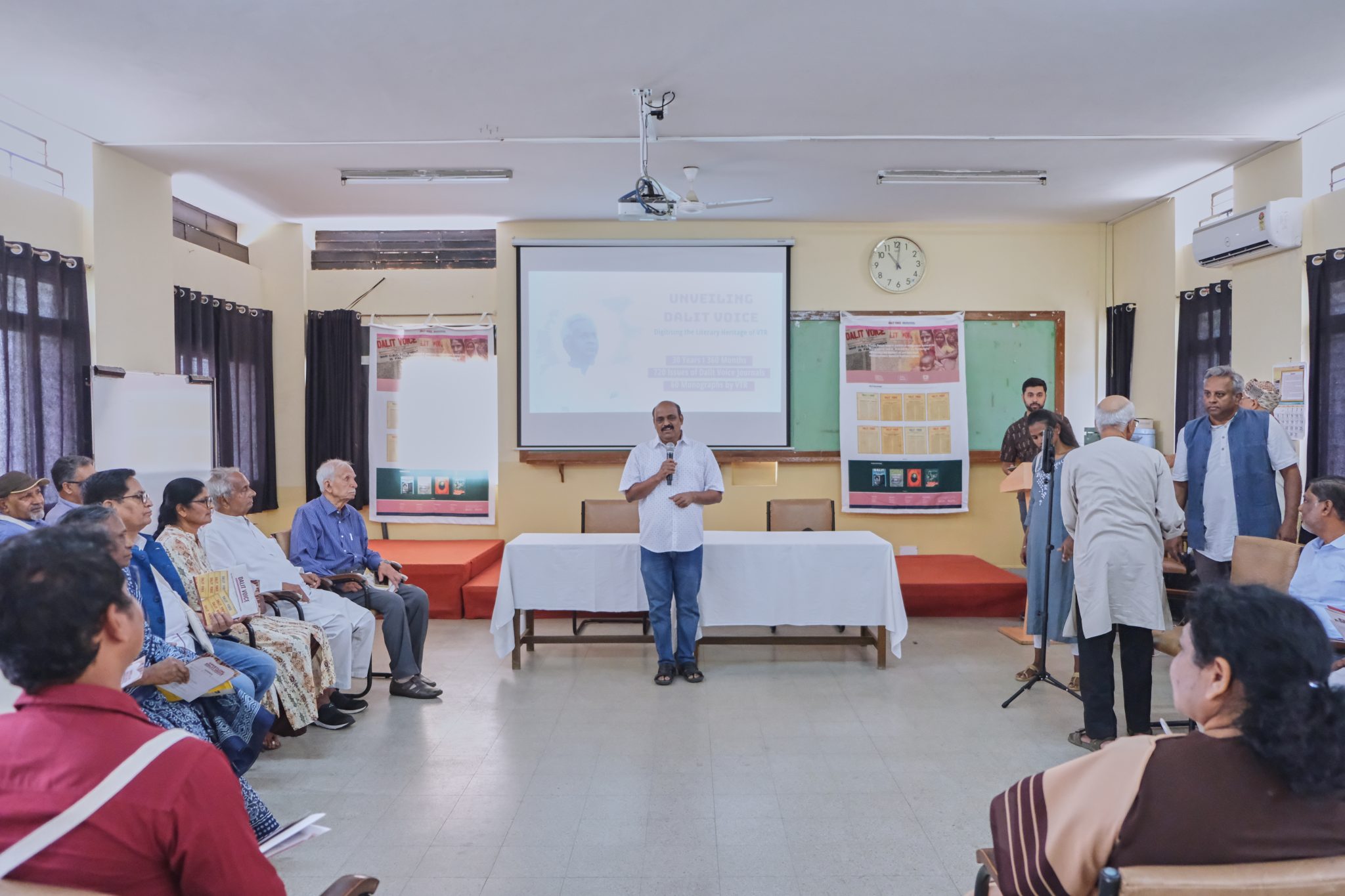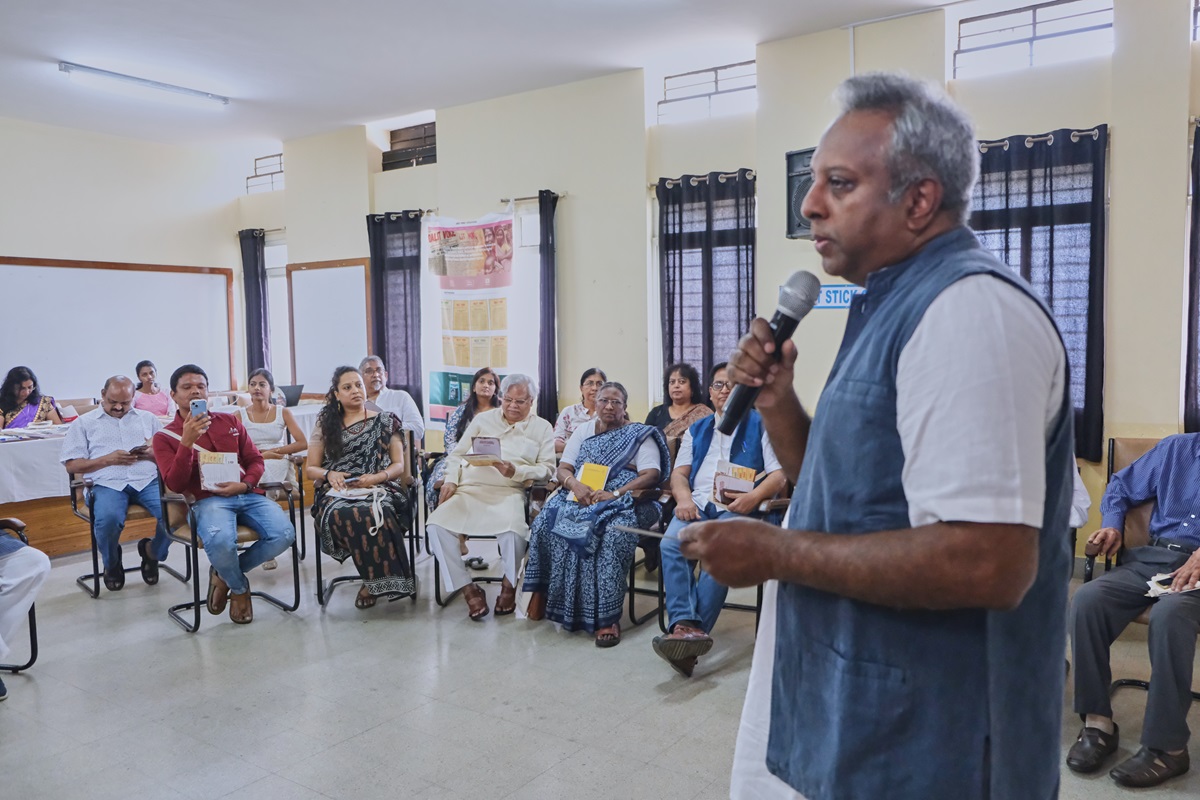Dalit Voice was a political magazine based in Bangalore, India, known for its forthright advocacy on behalf of persecuted nationalities denied human rights. Founded in 1981 by VT Rajshekar, a former journalist with the Indian Express, Dalit Voice became the largest circulated Dalit journal in India.
‘Unveiling Dalit Voice Web Portal’ was a meet of journalists, activists, development professionals, politicians and academics working in the field of Dalit rights and empowerment of marginalized communities. This included several people whose work has been influenced by VTR. Speakers such as Dr. Selvaraj A from Indian Social Institute, Salil Shetty from Harvard University, Amrita Shetty from the Dalit Voice, Paul Divakar N from Global Forum of Communities Discriminated on Work and Descent, Ashok Bharati from NACDAOR, Beena Pallical from NCDHR, Jasbir Singh Dhody from the Bengaluru Gurudwara Sabha, Prakash Rathod a Member of the Karnataka Legislative Council, Corrine Kumar from CIEDS Collective, Ruth Manorama winner of the National Federation of Dalit Women & Rights Livelihood Award, Kancha Iliah Shepherd an OBC Scholar, Sukhdeo Thorat from the Indian Institute of Dalit Studies, Annie Namala from the Centre for Social Equity & Inclusion, Gopinath from BSP, Basavaraj from the Dalit Sangharsh Samiti and Umar Farooq from the Hub Foundation spoke about the importance of VTR’s work even in today’s context.

Dr. Selvaraj A started the meet by addressing the members “we have all witnessed VTR’s extraordinary work and have had the honour to know him personally. Today, we are making an attempt to take his work to the next level and make it accessible to more people.” The web portal is being created to archive VTR’s work through 720 issues of the Dalit Voice Journals and 60 Monographs over 30 years and amplify marginalised voices. It will also provide a platform for the historically silenced and invisiblised narratives of the Dalit community. It also aims to preserve cultural and historical narratives by recording and archiving the lived experiences of Dalits.

Salil Shetty invited all the participants of the meeting to contribute to this initiative of archiving and digitally documenting the work of VTR. He added “your support is absolutely essential in taking forward this initiative.” The portal would also democratise information and provide equal and inclusive access to knowledge. The portal will allow for intergenerational learning and provide access to historical Dalit literature, writers and leaders. It is an opportunity for the development of informed and empowered leaders from the Dalit and other marginalized communities to understand VTR’s knowledge, thoughts and writings. Osama Manzar spoke about the role that ‘digital’ is going to play in this initiative “it is just a small tool that happens to bridge a very important gap- that of information. Through this initiative we are hoping to bridge the gap of information, understanding and sharing between Dalit leaders and people who want to lead and be part of movements that strive to bring about justice.”

Paul Divakar emphasised on the relevance of the Dalit Voice in today’s scenario “if someone reads the volumes, they will think that it is a magazine that has been published today, not 30-40 years ago. That is the relevance of his work and therefore it is absolutely essential to make his work accessible to today’s youth.” The group of leaders, journalists, academics and development professionals agreed that VTR’s work, though 30-40 years old, is still very relevant to the issues that the Dalit communities face even in 2024. This platform would give the younger generation access to the work that has inspired several Dalit leaders in the 20th century inspiring future movements that can take the civil liberties and human rights issues forward.

The portal will serve as a landing page with all the reading material and would be very useful for researchers, academicians and young Dalit leaders. However, increasing the reach of the Dalit Voice should be done through social media, especially to reach out to the younger audience. The portal strives to support and aggregate the work of other collectives and initiatives working in the field of Dalit rights and empowerment. This portal currently is usable for academicians, researchers and others who already have knowledge about the issues that the Dalit Voice discusses; an attempt now needs to be made to reach the masses to influence popular thought, narratives and movements.







REFERENCE AND LINKS:
VTR Tribute Video
Dalit Voice Archive Introduction
TESTIMONIALS:
Dr. Sukhadeo Thorat
Pr. Kancha Shepherd
Suraj Yengde
Website: www.dalitvoice.net
